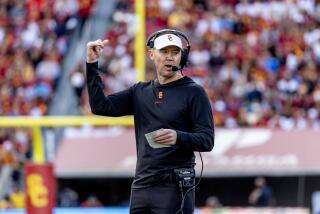Bruce’s Suit Is Settled for $471,000
- Share via
COLUMBUS, Ohio — Fired Ohio State University football coach Earle Bruce dropped a $7.4-million lawsuit against the university and its president Friday in a settlement that gives Bruce an immediate lump sum payment of $471,000.
Details of the agreement were disclosed by John C. Elam, the lawyer for the university, at a hastily called news conference that neither Bruce nor OSU President Edward Jennings, a defendant in the lawsuit, attended.
“I would say that both President Jennings and Coach Bruce in the statement indicate they want to put this matter behind (them). They’re both interested in Ohio State University, and . . . both regret the fact that it was necessary for there to be litigation,” Elam said.
The two-page settlement agreement provides for the university to pay Bruce $471,000 within three business days.
“This is to make him whole for what he would have received had he continued in his employment between now and June 1989,” Elam said.
Bruce was paid less than $90,000 annually as head coach. Under time remaining on the contract in effect when he was fired by Jennings, Bruce would have been entitled to about $140,000.
“He also had a TV contract, a sporting equipment contract, miscellaneous clinics, and the figure that was arrived at, excluding any fees, any other rights, was $471,000,” Elam said.
If Bruce finds a job before July 1, 1989, he will have to pay back part of the settlement.
“The salary he then gets he would have to pay back to the university because of the amount he’s being paid today in this settlement. It’s a set-off. But it’s also saying if he doesn’t get employment, the entire amount is his,” Elam said.
Elam said the settlement was fair to both parties, and that university trustees “heartily support” the agreement. He said the settlement grew out of his talks with Bruce’s attorney, John Zonak.
“They were certainly aware that through the rumors and the other things that this was adverse to the university, and some might contend also adverse to Coach Bruce. It was in the interest of all parties to get this resolved,” Elam said.
Jennings, in a written statement, said: “I express my regret to the family of Earle Bruce for the anguish this matter has caused them. We at Ohio State thank Earle for his years of service to this institution and wish him success in his future endeavors.”
Bruce, in a written statement, said: “I am sorry for any embarrassment that this incident has caused and I am glad to leave this matter behind me. I continue to support Ohio State and the Buckeye football program.”
As part of the settlement, Jennings and Bruce agreed not to make any detrimental comments or to alter or terminate the agreement, nor may it be changed by their successors, administrators or heirs.
“Is there a winner?” Elam asked. “Hopefully, the Ohio State University will be the winner in that the focus can come back to a tremendous institution, all that it means to the state of Ohio and nationally, and to that extent there’s a winner.
“Also, I believe there’s a winner in that this is the type of litigation that doesn’t help anyone,” he said.
An OSU official who asked that his name not be used said that the money going to Bruce would be drawn from general university funds, which include revenue from such sources as fees for services, and ticket sales, and not from any specific account. He said he believed state subsidies would not be used.
The firing sparked an outburst of public criticism against Jennings and the university trustees who fired Bruce. Bruce’s teams at Ohio State compiled an 81-26-1 record and won four Big Ten titles in nine seasons. This year’s team was 6-4-1 and had lost three straight games when his firing was made public before the Michigan game. Ohio State defeated Michigan, 23-20, in Bruce’s final game as coach.
Bruce, 56, was fired Nov. 16 by Jennings. The coach filed suit four days later in Franklin County Common Pleas Court.
In the suit, Jennings was accused of firing Bruce because Jennings knew the coach disapproved of Jennings’ life style. In a televised interview announcing the lawsuit, attorney Zonak accused Jennings of “excessive drinking.”
Elam said he felt Jennings had improperly been brought into the matter.
“I believe that this was, and this is, the basis of the settlement, a contract dispute between Coach Bruce and the university. Anything else, in my viewpoint, was improper,” he said.


